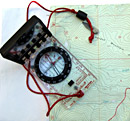Copyright & Revisions: Original copyright © 1983. Reformatted in 2013. No changes made to text.
Publication History: This is the original paper published in Association of College Unions-International Bulletin, June, 1983, pp. 4-7.
Reproduction Information: You are welcome to provide links to this page or to use short quotations and paraphrases in other documents as long as they appropriately reference the source. There is no charge for non-profit organizations to reproduce or publish extensive parts or all of this paper, but please obtain advanced permission from Ron Watters (wattron@isu.edu). Photo credits: Ron Watters.
Editor's Note: This paper, published in 1983, was written in response to a number of people in the field who were pushing for "outdoor leader" certification programs. At that time (and some continue to do this day) it was suggested that individuals who obtained and possessed leadership certification could then go on to safely organize and run outdoor trips and manage an outdoor program — such as you might find at an university. I found that suggestion alarming, and I wrote this opinion piece for a publication which is distributed to student activities personnel at colleges and universities.
I was primarily arguing against broad, all-encompassing certification programs which in my mind can never replace training, apprenticeship and experience — the school of hard knocks if you will. Certainly some certifications are welcomed and valued in the field such as wilderness first aid and wilderness first responder courses. But these days, sport specific certifications are proliferating, and it's my belief that a good many of them don't make things any safer. What they certainly do is to make things more costly, and with frequent re-certifications required, they keep things costly in a field in which jobs are seasonal and remuneration is low. But that's for another paper.
Outdoor programs, organized within a college union structure, have proliferated throughout the United States and Canada. Their philosophies, types of offerings, and extent of commitment vary from school to school, and the union personnel who direct the outdoor programs are as varied as the programs. Some are run by students; many are run by activities directors who have other responsibilities; and many of the most successful programs are run by full-time outdoor program directors.
Because the activities of an outdoor program — mountaineering, whitewater river running, canoeing, ski touring, etc. — can be potentially dangerous, the individuals working for a program need to be suitably qualified. But what are these qualifications and are there programs to certify that outdoor program personnel are qualified?
Currently, there is no national standardized certification program by which an organization can judge the suitability of personnel. Currently each individual union decides those standards. Although the system has worked quite well, especially for those schools which emphasize outdoor programming, some well-meaning souls decry serious problems.
One long-time mountaineer, Paul Petzolt, has been touring the United States talking to numerous groups about the Wilderness Education Association (WEA), his organization to certify outdoor leaders. Petzolt and proponents of certification programs argue that "certified" individuals assure employers that potential outdoor program employees have a set of minimum standards which will qualify them to lead groups on safe outdoor trips. The certification program, proponents claim, will produce a person with good judgment who has the wisdom to react positively in dangerous outdoor situations. It is further argued that certification programs will reduce outdoor accidents.
Such results sound like an administrator's dream. No more worry. The certification badge will cure all ills. But is there really such a panacea? Will certification improve outdoor programs?
I submit that certification provides little tangible improvement, and in many cases, burdens outdoor programs and unions with ponderous, bureaucratic hassle and greater expense. Certification can also indirectly lead to greater risks in outdoor activities. Before progressing further, a point must be made. What is being discussed here is certification, a badge or paper that says a particular individual is qualified to be a leader in the outdoors. It is this badge or paper of which I take issue. No one debates the benefits of classes and courses which update skills and knowledge. But if someone or some commercial venture runs a course and awards a "certification" that guarantees the bearer is an "outdoor leader," the debate is on.
The debate has never been so prominent as in the case of the American Alpine Club. As one of the nation's most influential outdoor organizations, the Club tried to institute a climbing certification program. The climbing community — both professionals and laymen — responded with a barrage of adverse reaction equal in intensity to a Mt. St. Helen's eruption. After considering the many pitfalls, the Club decided against a certification program.
Why? Because in climbing, as well as in other outdoor endeavors, the most important asset that mountain guides and instructors can possess is wise judgment. No matter how extensive or how structured a certification program, it cannot teach or assure good judgment. judgment comes only with extensive experience — many days spent climbing in the mountains in summer and winter, in good and adverse weather.
Rather than depending on a certification program, climbing school operators prefer to choose instructors based on their own guidelines. To them, recommendations by other climbers and a review of the individual's climbing experience is more valuable than a certification badge. They may use other standards to judge a prospective employee, but the important thing for them is that they — not someone else — determine those standards. They know what kind of men and women they need for their program to be successful, and they know it is to their advantage to hire good guides and instructors. The word gets around fairly rapidly when an operation hires shoddy instructors.
Mountaineering is just one aspect of a multifaceted outdoor program. A variety of activities, from whitewater kayaking to sailboarding, from cross-country skiing to spelunking, constitute outdoor programs. Is there really a program generic enough to certify outdoor program personnel to manage such a broad range of activities? An examination of one specific program, the Wilderness Education Association (WEA), might help answer this question. WEA, a current leader in what some have perceived as a race to establish credibility as a certifying organization, has 18 curriculum elements in its certification program: judgment, leadership, expedition behavior, environmental ethics, basic camping skills, ration, equipment, clothing, health and sanitation, travel techniques, navigation, weather, first aid, natural and cultural history, specialized travel, group processes, trips planning, and evaluation.
Basically, the WEA course centers on backpacking as a medium to teach the above curriculum elements. Backpacking certainly is an important activity of an outdoor program, but it is only one of many. Take for an example kayaking. At Idaho State University, we have an extensive whitewater program with several semester-long classes and skill workshops and a whitewater symposium. WEA mentions kayaking once; it is doubtful from the description that WEA clients will receive much instruction in the sport. Yet, is this "certified" outdoor leader ready to come into our program to teach kayaking? Of course not. Like mountaineering school owners, I value a person's experience in kayaking, the rivers he has run, and how well he relates to people more than I value a certificate.
Sailboarding, an activity that is rapidly gaining popularity, is another case in point. Sailboarding can be part of any outdoor program regardless of location in the United States. All that is necessary is a lake or large pond, wind, and a sailboard. Some of Idaho State's most popular workshops are sailboarding clinics. If WEA is to be a certification program for outdoor programs, sailboarding should certainly be a part of the curriculum. WEA does not even mention it in its literature. But WEA should not be singled out.
A basic paradox exists in any certification program for outdoor program personnel. Certification for outdoor programs must be structured so broadly to cover such a wide range of activities that it loses its value in any specific activity skill. Clients of certification programs are often led to believe that once they obtain their certification papers, they will have all the skills necessary to run an outdoor program. Unfortunately the impression is false and can be dangerous. Suddenly a person thinks that he or she has the certification credentials, and along with it, a false sense of security that he or she is an "outdoor leader" who can safely lead groups. But without good judgment, such a person can potentially lead groups to disaster.
Professional outdoor educators cannot agree on this certification issue. A recent survey of recognized outdoor leaders in the United States by Outdoor Research Incorporated of Eugene, Ore., concluded: "The respondents as a group did not achieve any consensus toward certification. The data appeared to accurately reflect the disparity of the certification issue."
There is a lack of research to back up another point made by certification proponents. Proponents argue that certification will make outdoor activity safer and fewer accidents will result. Yet no study has been conducted that backs up this claim. Many of those involved in accidents are those who would probably never take a certification course in the first place.
Moreover, certification runs against the grain of basic outdoor program philosophy. During the program philosophy. During the 1960s, students at American universities fought stifling structure and eventually won greater independence and responsibility. The resulting changes have turned out to be the healthier for both students and administrators. Students are more prepared to assume productive, responsible roles in society, and college administrators, assuming less the role of policeman and surrogate parent, can concentrate on the business of education. Outdoor programs with participant — initiated programs within an environment of less structure have helped fill an important need of those students attracted to the outdoors.
Certification is a step backward. It is a step toward greater structure. Having a body of people set the standards and determine the rules for all outdoor programs destroys the independence and the freedom outdoor programs now have to police themselves and determine their own standards for their own geographical locations.
The most pragmatic way of viewing the polemic is to consider money. Nowadays with tighter budgets, most programs must squeeze out everything they can from their hard earned dollars. Requiring certification for outdoor program employees is extremely costly. A 24-day certification course can cost more than $600, not including travel. If I were to send my staff, I would forfeit my supplies, equipment, travel, and advertising budget for all of this year and part of next. Most of what my staff would be taught are skills and knowledge they already possess.
The idea that certification somehow magically transforms an individual into an outdoor leader needs to be put to rest. College unions will have far greater success setting their own standards and hiring people with solid experience in the outdoors.
[END]
|


